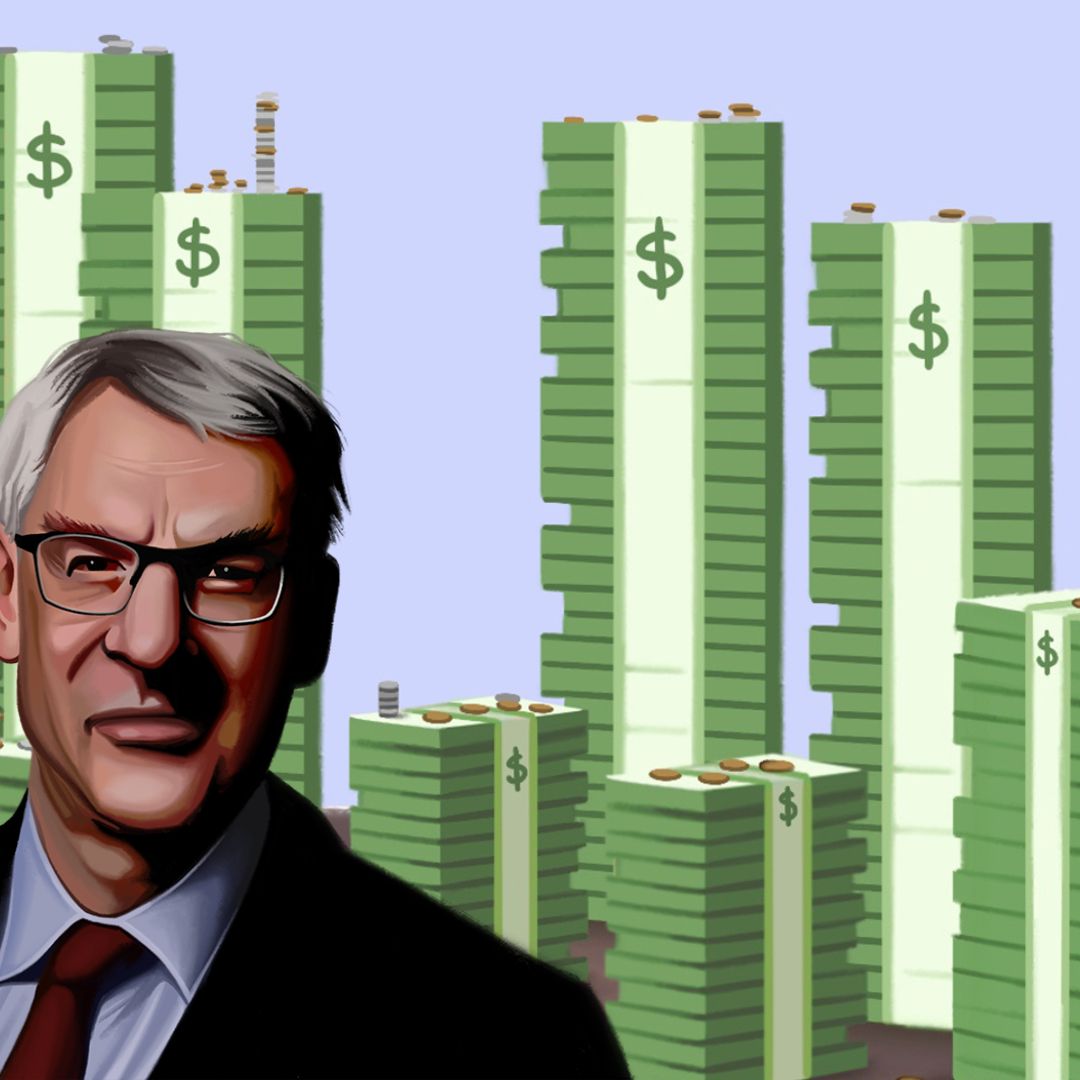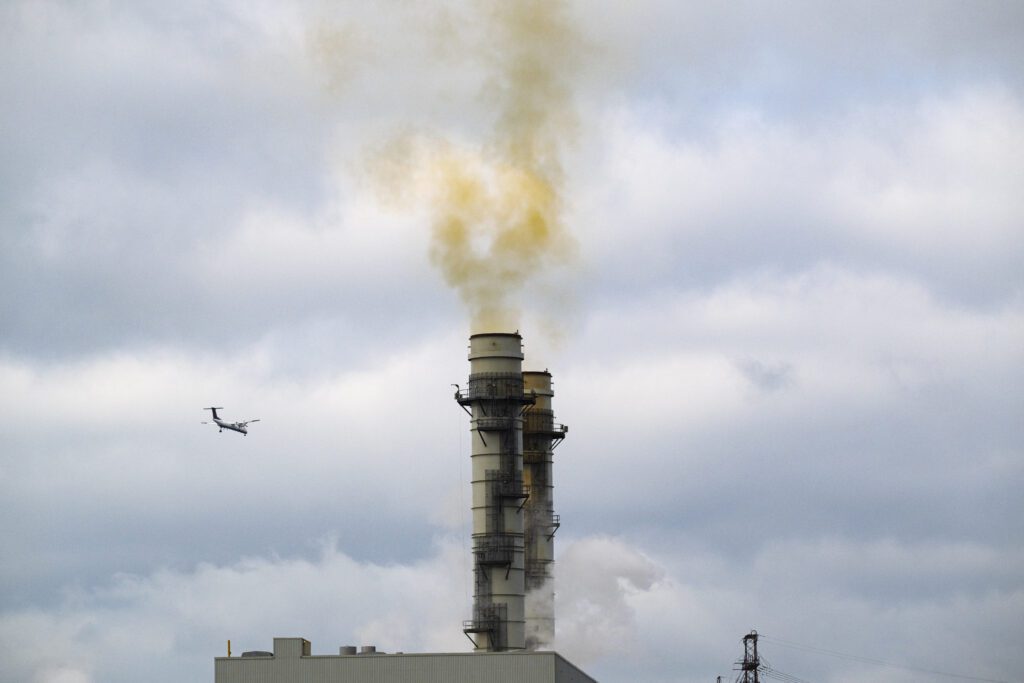There’s a direct line of culpability between fossil fuel corporations and climate change – it’s why so many oil and gas CEOs have topped our list of Climate Villains. But they aren’t the only powerful players who shoulder responsibility for keeping us hooked on fossil fuels, the largest source of greenhouse gas emissions.
Fossil fuels are finite resources, and extraction is an expensive endeavour. Coal, oil and gas production requires massive upfront capital investment to develop new extraction sites. Once developed, these projects also have high operating costs. (This is a very different business model than renewable energy, where it costs money upfront to build the initial infrastructure, but the sources of power, like sun and wind, flow freely and require only small amounts in ongoing costs for routine maintenance.) The fossil fuel industry relies on investment from the finance industry to keep up business as usual.
The largest financier of fossil fuels in Canada is the Royal Bank of Canada (RBC). In 2023 alone, RBC channelled more than $28 billion CAD into fossil fuel companies, a reduction from the $38 billion CAD reported for 2022. RBC’s CEO, Dave McKay, has long defended RBC’s investment decisions. Even when he was called to testify in front of Members of Parliament, he evaded responsibility and tried to justify RBC’s support for oil and gas.
RBC is the worst of a bad bunch. The banking sector as a whole needs to stop funding climate destruction. Environmental Defence is calling for climate finance regulation so that Canadian financial institutions like banks and pension funds help us work towards a safer climate and stable economy by reducing the money flowing into fossil fuels.
Will you help hold the financial sector accountable for real climate action?

Royal Bank of Canada:
- President & CEO: 2014-Pesent
- Group Head, Personal and Commercial Banks, Canada, USA, Caribbean: 2012-2014
- Group Head, Canadian Banks: 2008-2012
- Various roles in Personal Banking and Portfolio and Account Management: 1993-2008
- Customer Service and Operations Manager
Villain Career Profile
Dave McKay’s loyalty to RBC is only outmatched by his loyalty to the fossil fuel sector. While McKay has been working for RBC his entire career, RBC has been working to help oil and gas companies build fossil fuel projects for just as long. After many years of effort, financing fossil fuels between $25-$30 billion annually, the Banking on Climate Chaos report awarded his company the honour of “The #1 Financier Of Tar Sands Companies In 2023”. In 2022, RBC provided more financing to oil and gas companies than any other bank in the world.
While this dedication to oil and gas is outstanding, McKay’s finest work is his efforts to greenwash RBC. McKay supports the energy transition in public statements, and RBC talks a big game about climate action and “net zero.” However, from 2016, the first year of the Paris Climate Agreement, until 2023, RBC has poured over $350.5 billion CAD into fossil fuels. In recent years, 99 per cent of RBC’s energy finance has gone to fossil fuel projects. In 2022, the Competition Bureau of Canada began investigating RBC for misleading Canadians about its climate performance, but it’s apparent they are still greenwashing.
McKay fights back when he gets bad press. When campaigns criticized McKay and RBC, he used his platform to complain in a national paper that RBC was being unfairly targeted on social media and deferred responsibility for RBC’s fossil fuel financing to the government and other Canadian CEOs. When RBC was heavily criticized for its investment in the controversial Coastal Gas Link pipeline, which runs through unceded Indigenous land, RBC dug in its heals by shutting out Wet’suwet’en Hereditary Chief Na’Moks, Indigenous leaders and climate advocates from the RBC annual general meeting room into a secondary space. This prevented the Indigenous leaders from addressing McKay directly, even though they had brought forth a shareholder motion that was being considered at the AGM. In 2023, RBC voted against eight non-binding shareholder proposals related to Indigenous rights, climate change, pay transparency and racial equity. This included calls to respect the free, prior and informed consent of Indigenous Peoples by revising the bank’s human rights policies, preventing the financing of fossil fuel expansion, and setting 2030 targets for reducing absolute greenhouse gas emissions for oil, gas and utility clients.
RBC is proud to work closely with oil and gas companies, including the Pathways Alliance oilsands coalition. McKay is a collaborative CEO and often repeats the oil company message that more government subsidies are needed for Big Oil. Of course, McKay does not call for using massive corporate profits to pay for reducing polluting emissions or to clean up the environmental mess the industry is leaving behind. Financiers with deep pockets play a critical role in keeping the oil and gas industry in Canada happy, and McKay is happily a team player.
TOP SKILLS
CAREER HIGHLIGHTS
 Making So Much Money, You Forget Your Income
Making So Much Money, You Forget Your Income
- During his June testimony before Parliament, McKay couldn’t recall how much money he makes and had to be reminded that the RBC board just approved a 12 per cent raise, so McKay will receive $17 million in 2024.
 Leading the Bank With the Highest Fossil Fuel Financing
Leading the Bank With the Highest Fossil Fuel Financing
- RBC’s total financing for fossil fuels between 2016 and 2023 was $350.5 billion CAD.
- RBC’s annual financing for fossil fuels is between $25-30 billion. In contrast, its lending to renewable energy was just $5 billion in 2023. RBC’s most recent Climate Report states that its new goal is to triple lending for renewable energy to $15 billion in 2030 and to grow overall low-carbon energy lending to $35 billion by 2030. That’s six more years before it begins to match investment in low-carbon energy with current investment in fossil fuels. Meanwhile, the International Energy Agency has stated that we need to invest six times more in renewable energy than fossil fuels to bring about an energy transition in line with our climate change goals.
- RBC is the largest institutional shareholder of Suncor, one of Canada’s biggest and most polluting oil sands companies. Suncor plans to expand mining into the McClelland Wetland Complex in Alberta, even though peatlands are a crucial carbon sink for fighting climate change and an important ecosystem for wildlife.
 Mastering Greenwashing and Double Speak
Mastering Greenwashing and Double Speak
- RBC is a member of the Net-Zero Banking Alliance (NZBA). Part of the NZBA commitment states that member banks must “engage in public policies to help support a net-zero transition of economic sectors in line with science.” However, RBC is also a member of the Canadian Bankers Association and the Canadian Chamber of Commerce. Both of these industry associations have publicly opposed real-economy climate policies in Canada. The Canadian Chamber of Commerce, for instance, opposes the federal government’s proposed cap on pollution from the oil and gas industry.
- RBC’s Client Engagement Approach proposes to assess oil and gas clients on their ability to “conduct public policy engagement activities in accordance with the goals of the Paris Agreement” and disclose “ trade association memberships and their alignment with the goals of the Paris Agreement”. But RBC’s clients include oil companies like Suncor, which plan to expand oil and gas production against recommendations for reaching the Paris Agreement and also lobby against Canadian climate policies directly and through the Pathways Alliance and the Canadian Association of Petroleum Producers. Therefore, RBC does not seem to adhere to its own client engagement requirements.
- In interviews and media statements, like the first five minutes of this video, McKay repeatedly discusses the role of banks in financing the transition. However, when he elaborates, it’s clearly a dog whistle for continued investment in oil and gas. RBC’s new target for investment in renewables falls 12 times short of what experts say is needed to finance the energy transition.
- RBC says it needs to stay with its energy clients to help them transition. However, according to RBC’s 2023 Climate Report, only 2 per cent of its clients in the oil and gas sector have 1.5-degree-aligned transition plans.
The Climate Villains campaign highlights the leaders of the fossil fuel industry that play key roles in expanding and financing climate-wrecking fossil fuels, blocking climate action, and spreading disinformation. These villains are more concerned about their profits and wealth than the future of the planet, and that’s why we’re profiling the ‘resume’ of each climate villain.
We know that government intervention is critical for tackling the climate crisis with decisive urgency and at the scale necessary, so our approach is to put pressure on governments to pass more ambitious climate policies.
While we aim to advance policy that works in the public interest, oil and gas executives, and their powerful allies, are using their political power to block climate action in order to personally profit from more oil and gas production. This is nothing new: these companies have been actively blocking climate policy for decades. Their earlier tactics involved straight-up climate denial, and now they have pivoted to delaying, greenwashing and pushing dangerous distractions. And many people, including those in the government, are falling for it.
That’s why we’ll profile each of the villains, so you can learn more about the tactics they use to delay climate action and what you can do to fight back for real climate solutions.







 Making So Much Money, You Forget Your Income
Making So Much Money, You Forget Your Income 


